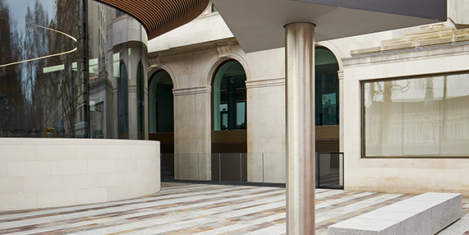March 30, 2017
AHMM completes work on New Scotland Yard for Metropolitan Police 0
 Architects Allford Hall Monaghan Morris (AHMM) have completed design work on the new headquarters for the Metropolitan Police Service (MPS) in London. The practice claims that the design ‘supports cultural organisational and conveys a new image for the MPS by creating a building that looks to engage with public and media alike’. The £60m new headquarters is a re-modelling and extension of the Curtis Green Building, a 1930s riverside site in Westminster, central London currently owned by the MPS. AHMM’s design includes the addition of new entrance and rooftop pavilions and a reworking of the existing accommodation. The new entrance is designed ‘to create a welcoming and non-institutional yet secure front door’ and reinstates the iconic revolving sign. The project has been completed as part of a major rethink of the organisation’s corporate real estate strategy.
Architects Allford Hall Monaghan Morris (AHMM) have completed design work on the new headquarters for the Metropolitan Police Service (MPS) in London. The practice claims that the design ‘supports cultural organisational and conveys a new image for the MPS by creating a building that looks to engage with public and media alike’. The £60m new headquarters is a re-modelling and extension of the Curtis Green Building, a 1930s riverside site in Westminster, central London currently owned by the MPS. AHMM’s design includes the addition of new entrance and rooftop pavilions and a reworking of the existing accommodation. The new entrance is designed ‘to create a welcoming and non-institutional yet secure front door’ and reinstates the iconic revolving sign. The project has been completed as part of a major rethink of the organisation’s corporate real estate strategy.









 Accommodation and food services, manufacturing, and transport industries will be hardest hit by limits on movement of EU and non-EU workers following Brexit, a new report has claimed. The latest edition of Mercer’s
Accommodation and food services, manufacturing, and transport industries will be hardest hit by limits on movement of EU and non-EU workers following Brexit, a new report has claimed. The latest edition of Mercer’s 








 The more recent employment figures for London suggest that until the terms of Brexit are known and put in motion, the jobs market will remain cautious. This is according to the latest Morgan McKinley London Employment Monitor which found that despite an 81 percent increase in jobs available and an 83 percent increase in professionals seeking jobs; compared to a 115 percent increase in jobs this time last year, the 2017 spike was muted in comparison. The 83 percent increase in job seekers month-on-month is coupled with a 29 percent decrease, year-on-year. Contributing to the decrease is the trickling off of non-British EU nationals working in the City, who comprise up to 10 percent of its workforce. In a post-Brexit survey of professionals conducted by Morgan McKinley, these individuals reported either moving abroad, or considering leaving London because of Brexit.
The more recent employment figures for London suggest that until the terms of Brexit are known and put in motion, the jobs market will remain cautious. This is according to the latest Morgan McKinley London Employment Monitor which found that despite an 81 percent increase in jobs available and an 83 percent increase in professionals seeking jobs; compared to a 115 percent increase in jobs this time last year, the 2017 spike was muted in comparison. The 83 percent increase in job seekers month-on-month is coupled with a 29 percent decrease, year-on-year. Contributing to the decrease is the trickling off of non-British EU nationals working in the City, who comprise up to 10 percent of its workforce. In a post-Brexit survey of professionals conducted by Morgan McKinley, these individuals reported either moving abroad, or considering leaving London because of Brexit.















March 8, 2017
In a crowd of truths, we can discern and reclaim what it means to be human 0
by Neil Usher • Comment, Facilities management, Technology, Workplace design
(more…)